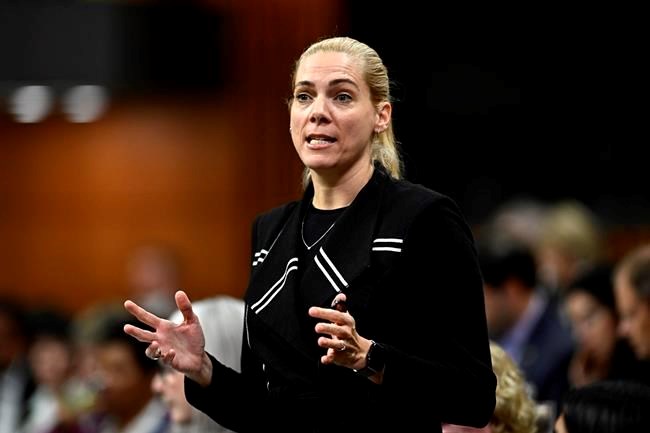Ottawa has agreed to set a $100-million yearly cap on payments that Google will be required to make to media companies when the government's controversial online news legislation takes effect at the end of the year.
The announcement Wednesday has the Liberals bending to the tech giant's demands after Google threatened back in February to remove news from its platform.
The Online News Act compels tech giants to enter into compensation agreements with news publishers for content that generates revenue for companies such as Google by appearing on its sites.
Broadcasters and French-language and Indigenous news organizations would join newspapers in being eligible for the deals, with draft regulations suggesting the amount of money would be linked to the number of full-time journalists on staff.
A formula in the government's draft regulations to implement the bill would have seen Google contribute up to $172 million to news organizations. Google balked, saying it was expecting a figure closer to $100 million, based on what it said was a previous estimate from Canadian Heritage officials.
The company appears to have got what it wanted after an extended period of negotiation.
Still, Canadian Heritage Minister Pascale St-Onge called it a "historic development," insisting Wednesday that the agreement was ultimately a win for the government and for the local news publishers it is seeking to support.
"We have found a path forward to answer Google's questions about the process and the act. Google wanted certainty about the amount of compensation it would have to pay to Canadian news outlets," she said on Parliament Hill.
"Canada reserves the right to reopen our regulations if there are better agreements struck elsewhere in the world," she added.
St-Onge also noted that the $100-million figure will be indexed to inflation.
Google's president of global affairs, Kent Walker, thanked the minister for "acknowledging our concerns and deeply engaging in a series of productive meetings about how they might be addressed."
He said in a statement that the "extensive discussions" addressed the company's "core issues" with the bill.
"While we work with the government through the exemption process based on the regulations that will be published shortly, we will continue sending valuable traffic to Canadian publishers," Walker said.
The deal will allow Google to comply with the legislation by paying into a single collective bargaining group that will serve as a media fund.
Meta, on the other hand, complied simply by blocking all news content from Canadian users of its largest platforms, Instagram and Facebook. A statement from the company Wednesday suggested that hardline approach hasn't changed.
"Unlike search engines, we do not proactively pull news from the internet to place in our users’ feeds and we have long been clear that the only way we can reasonably comply with the Online News Act is by ending news availability for people in Canada."
Prime Minister Justin Trudeau said he was satisfied with the agreement with Google and held out hope that Meta would eventually come around.
"Unfortunately, Meta continues to completely abdicate any responsibility towards democratic institutions and even stability," he said, "but we’re going to continue to work positively in those areas."
Last month, News Media Canada — a lobby group for hundreds of Canadian newspapers and magazines — said it agreed with many of the issues Google raised during the back-and-forth over how the bill would be implemented.
The group said there should be a cap on how much the search giant would have to pay under the law.
But Friends, an advocacy group for Canadian broadcasters, said the deal doesn't deliver the kind of support for journalism that it had been hoping to see.
"We will be looking to the regulations to ensure that smaller, independent, and equity-seeking media groups are assured access to funding," executive director Marla Boltman said in a statement.
An official with the Canadian Heritage Department said the final regulations for the law, which are due by mid-December, will also address Google's other concern that the law establishes linking to news sites as the basis for payment.
The official said final regulations will clarify that Google's payment is to help news publishers and broadcasters, and not for news links.
CBC and Radio-Canada will also get a portion of the $100 million, but that will be determined once regulations are finalized.
In addition to its financial contribution, Canadian Heritage said Google will continue to make programs available for Canadian news businesses, such as training, tools and resources for business development and support for non-profit journalism projects.
Google said Wednesday that the deal means there will be no immediate changes to existing agreements it has with publishers in Canada under its Google News Showcase agreements, which were part of a $1-billion global investment.
The company said it will review its ongoing investments in Canada when the final regulations are published.
Google wouldn't say how much it is already paying publishers under existing contracts, saying such agreements are confidential commercial arrangements.
Companies that fall under the Online News Act must have total global revenue of $1 billion or more in a calendar year, "operate in a search engine or social-media market distributing and providing access to news content in Canada" and have 20 million or more Canadian average monthly unique visitors or average monthly active users.
For now, Google and Meta are the only companies that meet those criteria.
This report by The Canadian Press was first published Nov. 29, 2023.
Mickey Djuric, The Canadian Press
Note to readers: This is a corrected story. A previous version stated that Google said there would be immediate changes to existing deals with Canadian publishers under its Google News Showcase agreements.



